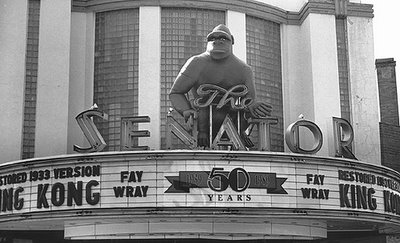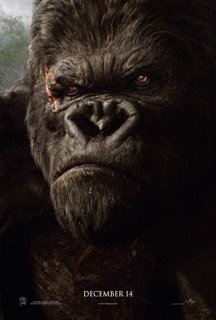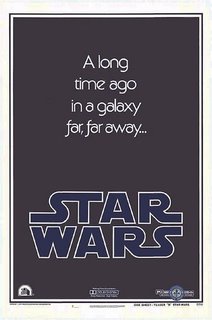Sonic death monkey
 Not having anything better to do between midnight and 3 a.m. this morning, I bundled up and headed off to Baltimore's historic Senator Theater for its first showing of King Kong, Peter Jackson's remake of the 1933 RKO classic. The buzz on the updated version has been as enormous as the giant gorilla himself. In terms of sheer big-screen entertainment, it delivers as advertised and then some. I would not be surprised to see it give The Love Boat a serious run for its $600 million U.S. take.
Not having anything better to do between midnight and 3 a.m. this morning, I bundled up and headed off to Baltimore's historic Senator Theater for its first showing of King Kong, Peter Jackson's remake of the 1933 RKO classic. The buzz on the updated version has been as enormous as the giant gorilla himself. In terms of sheer big-screen entertainment, it delivers as advertised and then some. I would not be surprised to see it give The Love Boat a serious run for its $600 million U.S. take.Kong's release ties in with an article on Slate this week wondering if the soaring costs of digital effects are in fact ruining Hollywood? Initially it was thought that being able to create in a computer what it used to take loads of extras, sets, props, costumes, etc. to make would be a money saver. Paradoxically, however, as the power of computers to render more and more realistic effects has grown, so have directors' capacities and desires for bigger and better "bangs" for their bucks.
 Jackson, for example, ponied up his own money for an extra half hour of effects shots when production ran long and over budget, at a potential cost of upwards of $32 million to him personally. That's a lot of CGI bananas. In Jackson's case, thankfully, every penny of it is up on the screen. Depression-era New York City is recreated meticulously from the Empire State Building down to the Hooverville shanties.
Jackson, for example, ponied up his own money for an extra half hour of effects shots when production ran long and over budget, at a potential cost of upwards of $32 million to him personally. That's a lot of CGI bananas. In Jackson's case, thankfully, every penny of it is up on the screen. Depression-era New York City is recreated meticulously from the Empire State Building down to the Hooverville shanties. Remember the reveal in Jurassic Park when the party comes upon the brontosaurus (actually called an apatosaurus, apparently there is no such thing as a brontosaurus) eating the leaves off of a tree? A great movie moment and one of the first where the true power of the computer to create a completely convincing artificial environment was realized. Now imagine an entire herd of the creatures grazing peacefully only to be stampeded towards our heroes down a narrow ravine by a pack of maurading T-Rexes. The world of Jackson's Kong is completely immersive with rarely a moment that snaps you back into reality to remind you that it's just a movie.
 Like Jackson, I too was enthralled by the original King Kong as a child. Something about the story (Beauty and the Beast) and the imagery of Kong on top of the Empire State Building swatting down biplanes must tap into deeper myth channels in the psyche. And losing myself in the new Kong last night, I was reminded of my other seminal moviegoing experience as a child,
Like Jackson, I too was enthralled by the original King Kong as a child. Something about the story (Beauty and the Beast) and the imagery of Kong on top of the Empire State Building swatting down biplanes must tap into deeper myth channels in the psyche. And losing myself in the new Kong last night, I was reminded of my other seminal moviegoing experience as a child, Star Wars.
When the camera panned down on a world we had never seen before, and the screen is filled with these massive starships doing battle over the planet's surface, I don't think you had to be a wide-eyed seven year-old to buy into the conceit, though it probably helped. Many of the effects that wowed viewers then seem quaint by today's standards, and maybe in thirty years so will Jackson's. But the first time you saw Luke pilot his X-Wing down the Death Star trench, it was as real anything you left outside before you entered the darkened theater.
What Jackson understands, and what George Lucas at least understood with Star Wars, is that state-of-the-art effects alone won't save a movie without a good story at its heart. Hollywood produced many effects-laden pictures post-1977, none of which ever duplicated Star Wars's success. If King Kong does as well as expected, I imagine the digital effects race will only be ratcheted up further, along with studios' costs to make the latest greatest CGI-fest. And most of them will be mediocre at best if the executives greenlight them based only on how cool the set pieces sound.
For the screenwriter, it seems to me to be a double-edged sword. Because technology has progressed to the point that literally anything is possible - if you can dream it up, they can make it - the temptation exists to take the computer folks up on the challenge. As the Slate article indicates, it is no longer "we can fix it in post" but "we can create it in post." Before the writer rushes off to draft that scene where the giant army of evil robotic cats marches off to engage the opposing giant army of heroic doggy robots, however, said writer should make sure that there's a solid story underlying the big Pettageddon climax. And write some snappy evil cat leader/hero doggy warrior dialogue, not just the typical "meow meow" "WOOF!" one-liners that have become so cliche nowadays. Otherwise it's just throwing good money after bad.

0 Comments:
Post a Comment
<< Home